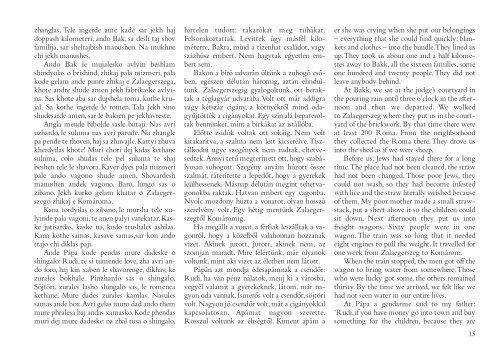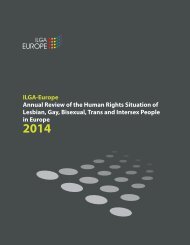You also want an ePaper? Increase the reach of your titles
YUMPU automatically turns print PDFs into web optimized ePapers that Google loves.
zhanglas. Tele ingerde ame kade sar jekh haj<br />
doppash kilometeri, ando Bak, sa desh taj shov<br />
familija, sar sheltajbish manushen. Na mukhne<br />
chi jekh manushes.<br />
Ando Bak le mujalesko avlyin beshlam<br />
shindyolas o brishind, zhikaj pala mizmeri, pala<br />
kode gelam ande punre zhikaj e Zalaegerszega,<br />
khote andre shude amen jekh fabrikaske avlyina.<br />
Sas khote aba sar dujshela roma, kothe krujal.<br />
Sa kothe ingerde le romen. Tala jekh sino<br />
shudesarde amen, sar le bakren pe jekhavreste.<br />
Angla mende bibolde sasle butaji. Nas avri<br />
uzhardo, le suluma nas avri parude. Na zhangle<br />
pa pende te thoven, haj sa zhuvajle. Kattyi zhuva<br />
kherdyilas khote! Muri chori dej kidas kethane<br />
suluma, colo shudas tele pel suluma te shaj<br />
beshen tele le shavora. Kaver dyes pala miz meri<br />
pale ando vagono shude amen. Sho vardesh<br />
manushen andek vagono. Baro, lungo sas o<br />
zibano. Jekh kurko gelam khatar o Zala eger -<br />
szego zhikaj e Komároma.<br />
Kana tordyilas o zibano, le mursha tele xu -<br />
lyinde pala vagoni, te anen palyi varekatar. Kas -<br />
ke jutisardas, kaske na, kodo trushales ashilas.<br />
Kana kothe samas, kasave samas,sar kon ando<br />
trajo chi diklas paji.<br />
Ande Pápa kode pendas mure dadeske o<br />
shingalo: Rudi, te si tumende love, zha avri an -<br />
do foro, haj kin xaben le shavorenge, dikhav, ke<br />
zurales bokhale. Pinzhardo sas o shingalo,<br />
Söjtöri, zurales lasho shingalo sas, le romenca<br />
kethane. Mure dades zurales kamlas. Nasules<br />
samas ande box. Avri gelas muro dad ando them<br />
mure phralesa haj andas xamasko. Kode phendas<br />
muri dej mure dadeske: na zhal tusa o shingalo,<br />
hirtelen tudott: takarókat meg ruhá kat.<br />
Felsorakoztattak. Levittek úgy másfél kilométerre,<br />
Bakra, mind a tizenhat családot, vagy<br />
százhúsz embert. Nem hagytak egyetlen em -<br />
bert sem.<br />
Bakon a bíró udvarán ültünk a zuhogó esô -<br />
ben, egészen délután háromig, aztán elindultunk.<br />
Zalaegerszegig gyalogoltunk, ott beraktak<br />
a téglagyár udvarába. Volt ott már addigra<br />
vagy kétszáz cigány, a környékrôl mind oda -<br />
gyûjtötték a cigányokat. Egy szín alá bepate rol -<br />
tak bennünket, mint a birkákat az istállóba.<br />
Elôtte zsidók voltak ott sokáig. Nem volt<br />
kitakarítva, a szalma nem lett kicserélve. Tisz -<br />
tálkodni ugye szegények nem tudtak, eltet ve -<br />
sedtek. Annyi tetû megtermett ott, hogy szabályosan<br />
suhogott. Szegény anyám húzott össze<br />
szal mát, ráterítette a lepedôt, hogy a gyerekek<br />
leülhessenek. Másnap délután megint teher va -<br />
gonokba raktak. Hatvan embert egy vagonba.<br />
Nyolc mozdony húzta a vonatot, olyan hosszú<br />
szerelvény volt. Egy hétig mentünk Zala eger -<br />
szegtôl Komáromig.<br />
Ha megállt a vonat, a férfiak leszálltak a va -<br />
gonról, hogy a közelbôl valahonnan hozzanak<br />
vizet. Akinek jutott, jutott, akinek nem, az<br />
szom jan maradt. Mire felértünk, már olya nok<br />
voltunk, mint aki vizet az életben nem látott.<br />
Pápán azt mondja édesapámnak a csendôr:<br />
Rudi, ha van pénz nálatok, menj ki a városba,<br />
vegyél valamit a gyerekeknek, látom, már na -<br />
gyon oda vannak. Ismerôs volt a csendôr, söj töri<br />
volt. Nagyon jó csendôr volt, már a cigá nyokkal<br />
kapcsolatosan. Apámat nagyon szeret te.<br />
Rosszul voltunk az éhségtôl. Kiment apám a<br />
er she was crying when she put our belongings<br />
– everything that she could find quickly: blankets<br />
and clothes – into the bundle. They lined us<br />
up. They took us about one and a half kilometres<br />
away to Bakk, all the sixteen families, some<br />
one hundred and twenty people. They did not<br />
leave anybody behind.<br />
At Bakk, we sat at the judge’s courtyard in<br />
the pouring rain until three o’clock in the afternoon<br />
and then we departed. We walked<br />
to Zalaegerszeg where they put us in the courtyard<br />
of the brickwork. By that time there were<br />
at least 200 Roma. From the neighborhood<br />
they collected the Roma there. They drove us<br />
into the shed as if we were sheep.<br />
Before us, Jews had stayed there for a long<br />
time. The place had not been cleaned, the straw<br />
had not been changed. Those poor Jews, they<br />
could not wash, so they had become infested<br />
with lice and the straw literally swished because<br />
of them. My poor mother made a small strawstack,<br />
put a sheet above it so the children could<br />
sit down. Next afternoon they put us into<br />
freight wagons. Sixty people were in one<br />
wagon. The train was so long that it needed<br />
eight engines to pull the weight. It travelled for<br />
one week from Zalaegerszeg to Komárom.<br />
When the train stopped, the men got off the<br />
wagon to bring water from somewhere. Those<br />
who were lucky got some, the others remained<br />
thirsty. By the time we arrived, we felt like we<br />
had not seen water in our entire lives.<br />
At Pápa a gendarme said to my father:<br />
‘Rudi, if you have money go into town and buy<br />
something for the children, because they are<br />
15



